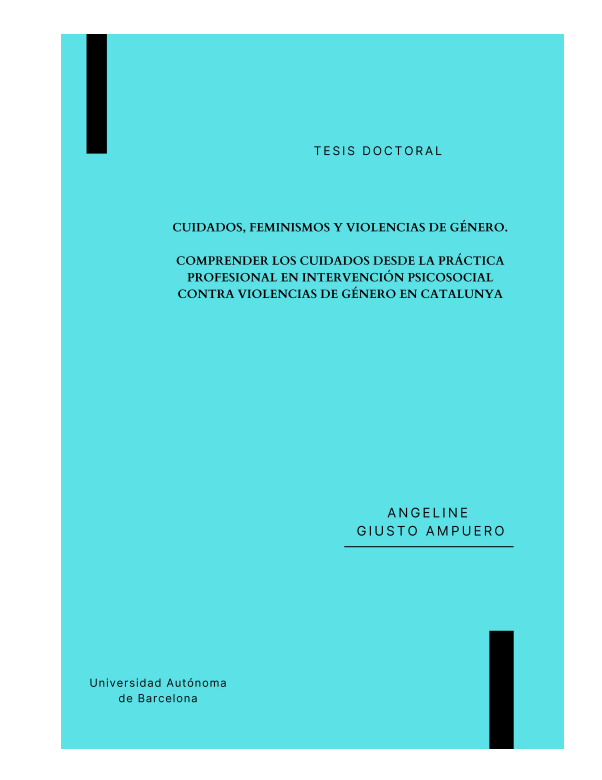Doctoral thesis defense of Angeline Alejandra Giusto
Cuidados, feminismos y violencias de género. Comprender los cuidados desde la práctica profesional en intervención psicosocial contra violencias de género en Catalunya

This thesis endeavours to understand the meanings, practices and perspectives constructed around care by professionals working in psychosocial intervention against gender violence in Catalonia (Spain). Its overarching goal is to contribute to the creation of institutional care frameworks and intervention practices – in the field of gender violence – that take into account the needs of professional practitioners and the quality of the assistance given to beneficiaries.
The care of professional workers is often overlooked both in psychosocial intervention services against gender violence and in scientific research; and the few instances in which it is mentioned tend to revolve around “burnout”. In my qualitative research I have chosen to distance myself from this definition, as its biomedical construction reduces the malaise of professional workers to a sum of clinical symptoms, thus ignoring its systemic causes. I address care as a phenomenon composed of individual, relational, social, political and contextual aspects, on the basis of feminist theories on interdependence, sustainability of life, intersectionality and right to care.
The participants in this study are professionals working in different kinds of services related to gender-violence: it is arguably these individuals who should define care perspectives and practices that will contribute to their work being sustainable and high-quality. I created five discussion groups with the participants and then applied thematic analysis. The results and discussion are structured in four chapters, one for each specific goal of this study.
In the first chapter, entitled ‘What is care?: meanings, dimensions and debates’ I analyse the way in which care is constructed on the basis of ‘wellbeing defined as the satisfaction of individual needs’, which sees care as an individual process, and ‘wellbeing defined as a dignified life’, which takes into account the macrosocial conditions of equality/inequality that affect the care of individuals. I also introduce the idea of ‘care’s pendular movement between freedom and responsibility’, in order to illustrate how freedom of choice and obligations related to care are distributed unequally depending on gender, race and social class.
In the second chapter, entitled ‘Subjects, spaces and the use of time in care practices’ I discuss the practices of (self-)care, collective care and care within the relationship between professionals and beneficiaries. I argue that the concept of (self-)care is dependent on collective care, as individual practices alone are meaningless without a community that supports them.
In the third chapter, entitled ‘Care, institutions and organisations: a tense relationship’, I argue that in these contexts the ‘lack of care’ perspective predominates, thus limiting the responsibility of organisations in the provision of institutional care and negatively affecting both the health of professional workers and the care given to beneficiaries.
Finally, in the fourth chapter, entitled ‘Care and psychosocial intervention against gender-based violence’ I argue that the ‘lack of care’ perspective in service-providing organisations is reinforced by structural and institutional violence that (re)produces the way government operates.
Finally, I propose a number of guidelines for the creation of care frameworks for intervention services which are based on the following ‘care ideals’: 1) acknowledging care as a right, not a privilege; 2) emphasising institutional responsibility with regards to the care of professional workers; 3) safeguarding continuity in the care chain; 4) materialising care into specific actions; and 5) taking into account the affective, pragmatic and bodily aspects of care.
Date: 02/12/24
Hour: 11 h
Place: Sala de Graus (Fac. Ciències Polítiques i Sociologia)